by Naomi L. | September 6, 2017 | Blog, Creative Writing, Featured |
Remember that post I shared last week about the hard truths of being a writer? Well, fear not; I promise you that was only half of the big picture. After all, why would anyone choose to write if it only ever brought misery? Being a writer can be just as rewarding as it is frustrating, and if you can power through its challenges, you’ll find an incredibly adventurous and fulfilling path ahead.
So for those of you who choose to follow this path, here are six perks of being a fiction writer that you can look forward to. Happy writing!
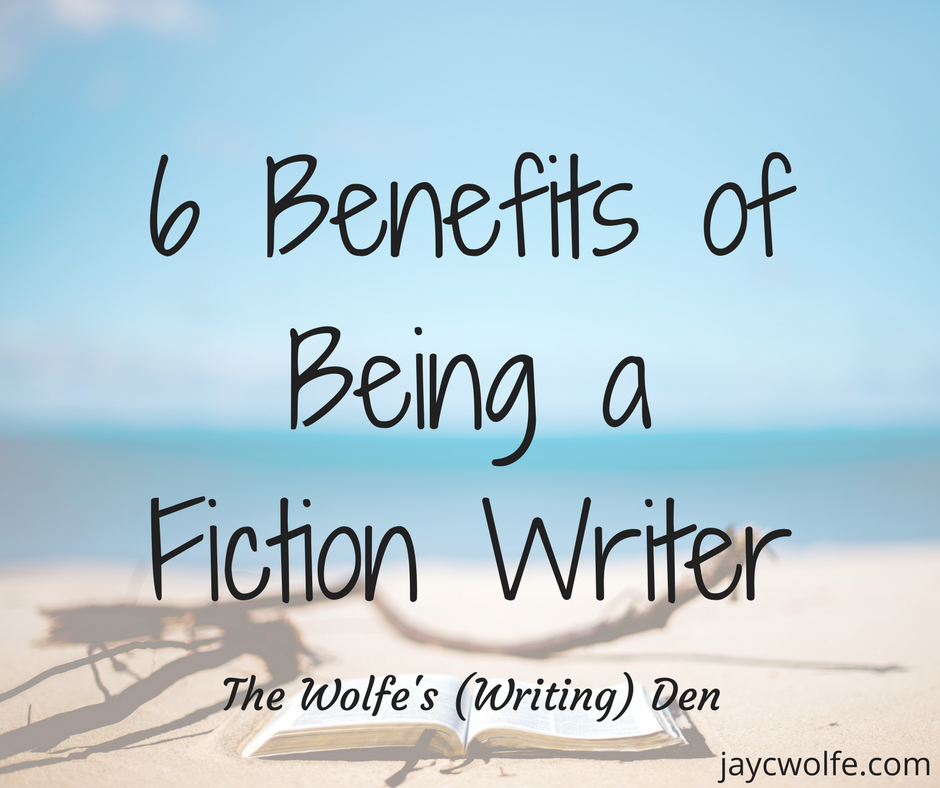
Writing Perk #1: You have the power to create anything.
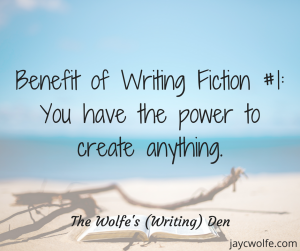 In a way, fiction writers make up their own class of superheroes. Some people have super strength, others are incredibly smart, and still others excel at almost everything they try. But writers? We have the ultimate gift: the power of creation.
In a way, fiction writers make up their own class of superheroes. Some people have super strength, others are incredibly smart, and still others excel at almost everything they try. But writers? We have the ultimate gift: the power of creation.
While I envy visual artists for their ability to draw, I’d still favor being a writer any day. The ability to paint vivid images with language is a special form of art with its own challenges, and when done right, it can be even more effective. A picture may be worth a thousand words, but imagery through words alone is an exercise for the imagination.
Anyone who’s ever tried writing a novel—especially a fantasy or science fiction novel—is familiar with the concept of “world building”. There’s much more to storytelling than conflict; you must create characters and settings to bring that conflict to life. And in my experience, there’s nothing quite as thrilling as the power to create an entire universe and direct the fates of its inhabitants any way you want. Besides, at what other job can you openly say you kill people for a living? Writing may not be the highest paying job in the world, but it certainly has benefits you can’t get anywhere else!
Writing Perk #2: You regularly exercise your mind and imagination.
 There’s nothing like writing a story to get those creative juices flowing. It’s no secret that writing has several psychological benefits such as catharsis and improved learning, and writing fiction has the added benefit of exercising the imagination. Creativity is always a useful skill, so you can never have too much of it!
There’s nothing like writing a story to get those creative juices flowing. It’s no secret that writing has several psychological benefits such as catharsis and improved learning, and writing fiction has the added benefit of exercising the imagination. Creativity is always a useful skill, so you can never have too much of it!
By regularly creating characters, settings, and plots, you exercise the ability to see situations from various perspectives and open your mind to all sorts of possibilities, as much in fiction as in real life. Practice with conflict resolution in fiction can also be surprisingly helpful when it comes to real-world problem-solving, as you’ll likely be able to foresee problems more easily and find better solutions. And if not, at least you’ll have another story to tell when everything’s said and done. Writing fiction provides plenty of benefits for your mind and spirit. Don’t let them go to waste!
Writing Perk #3: You have the best emotional release in the world.
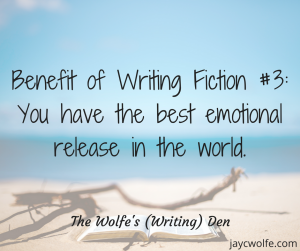 There’s a saying that goes, “Never wrong a writer. They get their revenge in print.” There’s another saying that goes, “If a writer falls in love with you, you can never die.” What do these sayings have in common? They prove that writers have the most powerful emotions in the world.
There’s a saying that goes, “Never wrong a writer. They get their revenge in print.” There’s another saying that goes, “If a writer falls in love with you, you can never die.” What do these sayings have in common? They prove that writers have the most powerful emotions in the world.
Being a writer, especially a fiction writer, takes a generous amount of vulnerability to pull off. Good fiction demands a fair share of emotion to resonate with the audience, and that means the writer must be an emotional being. We bleed our feelings onto the page and carefully craft our stories to evoke the empathy of our readers, and such an art form takes inspiration from real-life emotions. Fortunately, life provides emotional inspiration in spades.
As a writer, you should never be afraid to use your emotions in your work. When you’re happy, write motivational pieces with positive takeaways. If you fall in love, draw romantic stories or poetry from personal experience. Use a broken heart as the foundation of tragedies, and when someone infuriates you, adapt them into an expendable character and kill them off in the most satisfyingly painful way. In how many other jobs can you say your emotions are your most powerful tools? Use them to your advantage!
Writing Perk #4: You learn new things all the time.
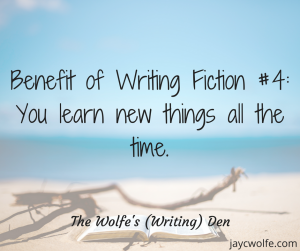 Think of the last time you wrote a story about something you’ve never done before. Chances are you had to do a fair amount of research to get it right, and you probably learned something unexpected while you did. This is one of the most enjoyable parts of writing fiction: you learn something new every day!
Think of the last time you wrote a story about something you’ve never done before. Chances are you had to do a fair amount of research to get it right, and you probably learned something unexpected while you did. This is one of the most enjoyable parts of writing fiction: you learn something new every day!
Whether you write fantasy/sci-fi novels, historical fiction, or anything in between, at some point during writing, you’ll run into a detail that you’ll have to look up. While research can be tedious sometimes, you can also see it as an opportunity to learn something you never would have otherwise. From ancient mythology to medieval weaponry to space technology, the world is full of fascinating information just waiting to be turned into stories. With all the research it takes to be a fiction writer, we probably learn more doing what we do than all the other professionals out there combined!
Writing Perk #5: You get rewarded for being yourself.
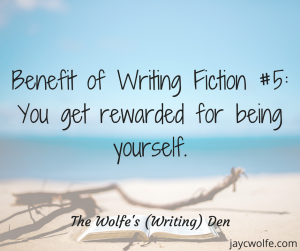 Let’s be honest: the absolute best writing always comes from the heart, and the only way to write from the heart is to be yourself. Hiding behind a mask of civility may get you ahead in the corporate world, but when it comes to writing fiction, imperfection is your greatest asset. No matter what genre you write in, it’s your original voice that will make it unique. You don’t have to be completely crazy (though eccentricity is definitely a plus); you just have to be relatable. And if you’re flawed—or in other words, human—you’ve already got that covered.
Let’s be honest: the absolute best writing always comes from the heart, and the only way to write from the heart is to be yourself. Hiding behind a mask of civility may get you ahead in the corporate world, but when it comes to writing fiction, imperfection is your greatest asset. No matter what genre you write in, it’s your original voice that will make it unique. You don’t have to be completely crazy (though eccentricity is definitely a plus); you just have to be relatable. And if you’re flawed—or in other words, human—you’ve already got that covered.
One of the most famous writing tips out there is “write what you know”, so when drawing inspiration from people for characters, the best person to start with is yourself. You know your own strengths and weaknesses, so you already have what it takes to create a well-rounded character. From there, work your way up to using other real people as inspiration for characters, and before you know it, you’ll be writing dozens of stories that readers will easily relate to.
Basically, if you’re only writing perfect characters who never deal with conflict in any way, you’re doing fiction wrong. Everyone has their flaws and problems, and if you can be open about yours, you can create meaningful and inspiring works of art, just by being yourself. How is that not the greatest job in the world?
Writing Perk #6: You can make a difference in the world.
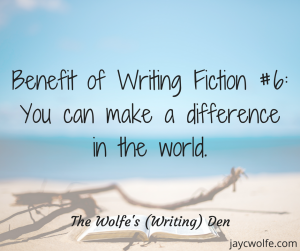 There are few forms of writing that make an impact quite the way storytelling does. While nonfiction generally focuses on logic and rational thought, stories have the power to mix truth with emotion in a unique style that appeals to a reader’s entire character, thus making for much more influential writing.
There are few forms of writing that make an impact quite the way storytelling does. While nonfiction generally focuses on logic and rational thought, stories have the power to mix truth with emotion in a unique style that appeals to a reader’s entire character, thus making for much more influential writing.
By becoming a writer, you’ve already taken a major step toward making a difference in the world. You don’t even have to change the entire world; the chance to influence even one person’s life is already worth the effort. You may not realize it yet, but you have the power to make a real difference. So share your stories and show people they’re not alone. Inspire those around you and use your words to make life better for everyone. The world could always use more stories, so keep on writing!
Can you attest to any of these perks of being a fiction writer? What other benefits of writing fiction would you add to this list?
by Naomi L. | August 30, 2017 | Blog, Creative Writing, Featured |
So you want to be a writer. Fantastic! But have you thought it through? Do you know what it really takes to be a writer? You might think you do, but if you’re only looking through rose-colored glasses at the glamour of being a famous author, you may be shocked to find some ugly bumps in the road. Writing is full of harsh reality checks, and if you’re not prepared for what lies ahead, those cold hard truths can tear you to shreds faster than you can say “unfinished manuscript”.
So before you head out on your grand writing journey, here are six hard truths about being a writer you should really be aware of. Proceed at your own discretion!
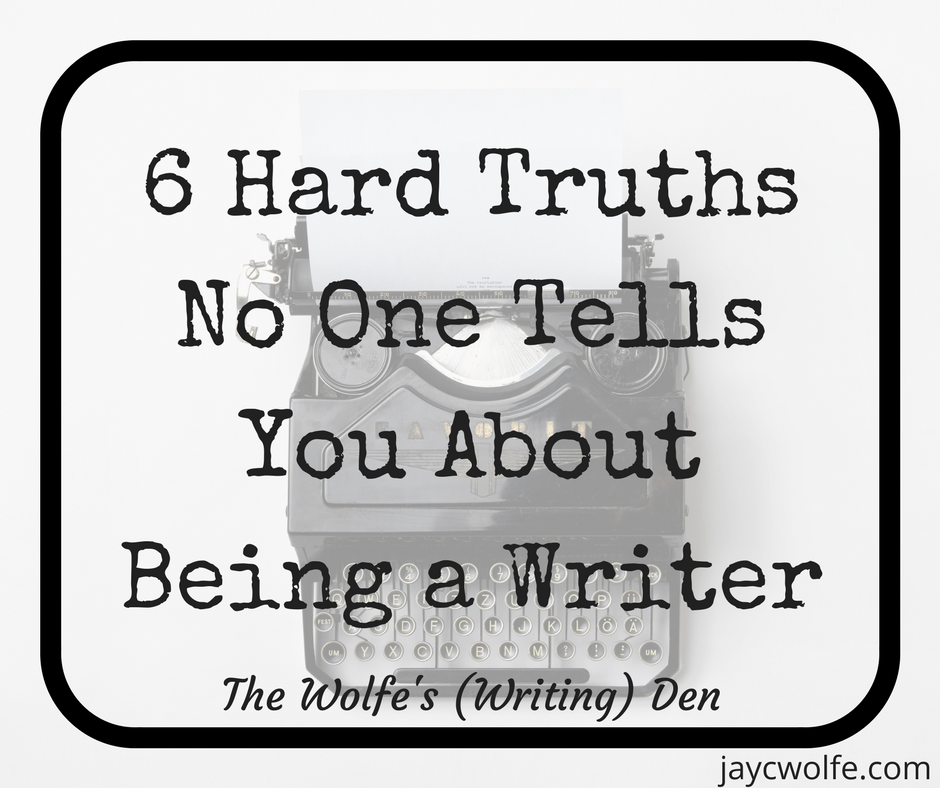
Hard Truth #1: Writing is not as easy as you think it is.
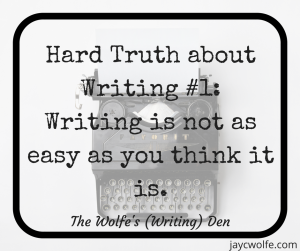 If you’re thinking about pursuing writing because it’s an easy way to make a living right off the bat, then stop right there. Turn around and go back, because this is not the calling for you. Or if you insist, proceed and find out the hard way: writing is not as easy as you think. In fact, some would go as far as to say writing is one of the hardest things in the world to do. Tons of hard work for relatively little reward? Nothing easy about that.
If you’re thinking about pursuing writing because it’s an easy way to make a living right off the bat, then stop right there. Turn around and go back, because this is not the calling for you. Or if you insist, proceed and find out the hard way: writing is not as easy as you think. In fact, some would go as far as to say writing is one of the hardest things in the world to do. Tons of hard work for relatively little reward? Nothing easy about that.
Let me be clear about something: writing itself is easy. It’s hardly a skill; I mean, we learned how to do it in preschool. What’s hard is writing well. If being good at writing were easy, everyone would be making a living from it. Or maybe no one would because everyone could do it for themselves. Either way, a world where everyone’s a writer would be vastly different than the world of “aspiring artists” we know today.
Everyone starts somewhere, and more often than not, “somewhere” is not very good. What separates the wannabes and amateurs from the serious writers is a commitment to mastering the craft. The amateurs will give up at the first sign of adversity: a lack of inspiration, difficulty editing, a polite yet stern rejection letter. The serious writers, on the other hand, will tackle those challenges and use them as motivation to improve. You can’t appreciate inspiration until you’ve faced hours of writer’s block, you can’t know how to self-edit until you’ve practiced enough times to learn what works, and you can’t find publishing success unless you keep pitching your work to people who might give you a chance.
If you go into the world of writing thinking it’ll be easy, then you’d better brace yourself for a lot of slaps in the face. The writing journey is a marathon, not a sprint. Approach it with respect, and you’ll find that while it may not get much easier over time, it will be much more rewarding in the end.
Hard Truth #2: Writing is not for everyone.
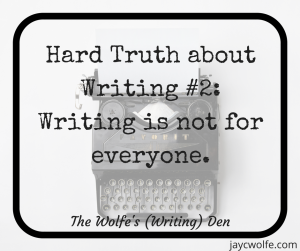 After dispelling the first myth about writing being easy, you may still want to pursue it for the sheer love of the craft. There’s nothing wrong with that; after all, a journey to becoming a writer should start with passion. But there’s more to being a writer than just writing.
After dispelling the first myth about writing being easy, you may still want to pursue it for the sheer love of the craft. There’s nothing wrong with that; after all, a journey to becoming a writer should start with passion. But there’s more to being a writer than just writing.
You might think that you don’t need to worry about editing or publishing or marketing because those jobs can all be handed off to someone else. Editing is what editors are paid for. Publishing and marketing can be handled by big publishing houses. All you have to do is write, and others will take care of the rest.
Yet in today’s world, where everyone is screaming over each other for attention, writers must be so much more. Writers must also be editors and marketers and, in the case of “indies”, even publishers. You will have to edit your own manuscript before you send it to a professional editor, and again after you get it back (expect to repeat this process several times). You will either have to convince an agent or a publisher to sell your book or make the decision to publish it yourself. You will have to do much of the marketing for your own book, regardless of which publishing route you take. And you will have to accept feedback when people actually read it, both good and bad.
So if you’re not prepared to put in all the hard work, to endure long periods of writer’s block and loneliness, edit and re-edit, power through rejections or self-publishing, and deal with criticism from readers, you might as well stop right here, because you clearly don’t have what it takes to be a writer. Well, not a published one, anyway.
This doesn’t mean you should give up writing forever; just maybe keep practicing in private until you can fully commit to becoming an author. When you’re ready to share your stories with the world, the world will be ready to read them. Until then, writing (publicly) is probably not for you.
Hard Truth #3: Inspiration doesn’t strike whenever you want it to.
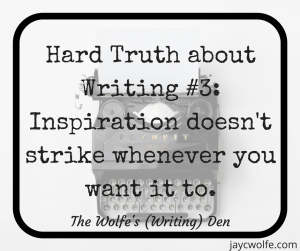 We all like to imagine artists as eccentric people in constant connection with the muses. Beauty is in everything, and even the most mundane details can be turned into a work of art in the mind of a creative person. Inspiration is anywhere and everywhere; you just have to know where to find it.
We all like to imagine artists as eccentric people in constant connection with the muses. Beauty is in everything, and even the most mundane details can be turned into a work of art in the mind of a creative person. Inspiration is anywhere and everywhere; you just have to know where to find it.
If this is your vision of writing, then prepare yourself for a world of disappointment. Much like money, inspiration doesn’t just grow on trees or fall out of the sky when you least expect it; you have to work hard to get it. The muses can be generous, but they’re also elusive. Sure, there will be plenty of times when inspiration strikes without warning, but most of the time, you will have to look for it yourself.
One of the hardest lessons you’ll learn about writing is that if you sit around waiting to write only when inspiration strikes you, you’ll never get any writing done. Many people assume that you have to get inspired to write, but believe it or not, it’s almost always the other way around: you have to write to get inspired.
Make time to create, even when you don’t feel like it. Put pen to paper or fingers to keys and start spilling words onto the page. If you don’t know where to start, use writing prompts, try writing exercises, or scribble random ideas in your notebook until something sticks. Just don’t be idle. Admit this to yourself once and for all: waiting for inspiration is nothing but a lame excuse to procrastinate. Stop waiting to be creative and just write already!
Hard Truth #4: Thick skin only comes with experience.
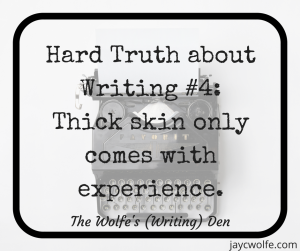 Picture this: You’ve finally published that novel you’ve been working on for years. You’ve done everything you could to make it perfect; now you sit back and wait for the praise to start rolling in. And for a while, it does: first from friends and family, then from total strangers! Everyone is liking your book! You’re a success! But just when you finally start to shed that crippling self-doubt…
Picture this: You’ve finally published that novel you’ve been working on for years. You’ve done everything you could to make it perfect; now you sit back and wait for the praise to start rolling in. And for a while, it does: first from friends and family, then from total strangers! Everyone is liking your book! You’re a success! But just when you finally start to shed that crippling self-doubt…
Gasp! What’s this? A bad review? Someone didn’t like your story! You’ve failed! All that doubt comes flooding back tenfold. And that’s why you’re now a tearstained mess, curled up on your bedroom floor and drowning yourself in chocolate for the third day in a row. Maybe you were never cut out for this writing stuff after all.
We see this advice in every publishing resource out there: if you want to be a writer, you have to have thick skin. But nobody tells you that thick skin isn’t something you magically get just because you wish for it. For most of us, the only way to learn how to brush off criticism is through brutal firsthand experience.
While it’s true that many people can dive headfirst into a profession without ever caring what people think, thick skin is especially hard for writers to develop because writing by nature requires vulnerability. As artists, we bear our souls on the page and show our emotions through our work, so when that work isn’t well received, we can’t help but take it personally. And why wouldn’t we? Our stories are our babies, and no one likes being told their baby is ugly!
No matter how much time you spend mentally preparing for bad reviews, your first one will probably hit you like a ton of bricks. Why? Because deep down, there’s a part of you that wants to believe it will never happen to you. Our fragile egos will us to believe that even though everyone has different tastes and opinions, somehow our work will be the exception that’s universally praised. And that kind of thinking is just as unrealistic as any fantasy story you’ve ever read.
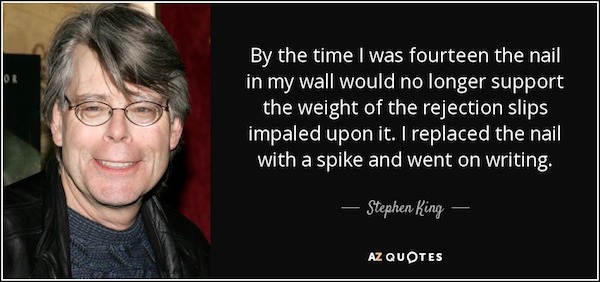
The truth is no one—and I mean literally no one—is immune to criticism. Every author gets a bad review at some point; it comes with being published. J.K. Rowling still gets one-star reviews for her critically acclaimed Harry Potter series. Stephen King, world-famous author of over two hundred stories, has too many critics to count. Margaret Atwood, Ernest Hemingway, F. Scott Fitzgerald, and Harper Lee all got scathing reviews for their classic novels when they first came out. And yet general consensus says they’re all great writers.
So don’t stress yourself out anticipating your first bad review. Instead, accept that it will come someday, tell yourself it’s okay to be upset when it does, and give yourself as much time and space as you need to move on from it. And above all, no matter how hard it seems in the moment, do not give up on writing. I promise the longer you stick with it, the easier it will get.
Hard Truth #5: Talent isn’t everything. Relationships are.
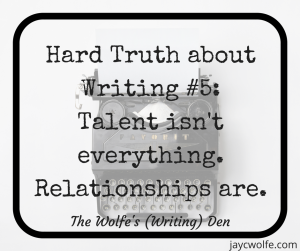 Have you ever read a well-known piece of writing—a novel, a short story, a poem—that was truly awful? Chances are you thought you could do way better. Maybe you can. Maybe you do. And maybe someday you’ll wonder why your name doesn’t appear next to those authors on the bestseller lists. Why should you have to struggle to be noticed while these writers get to enjoy fame they don’t deserve?
Have you ever read a well-known piece of writing—a novel, a short story, a poem—that was truly awful? Chances are you thought you could do way better. Maybe you can. Maybe you do. And maybe someday you’ll wonder why your name doesn’t appear next to those authors on the bestseller lists. Why should you have to struggle to be noticed while these writers get to enjoy fame they don’t deserve?
Because talent isn’t everything. That’s right, even in the world of art. Face it, even if you are extremely talented, so are thousands of other people who nobody knows or cares about. You may not be the only one reading this and thinking that your stories deserve more attention than such train wrecks as Twilight and Fifty Shades of Grey. So what makes all those terrible authors better than you? They have connections to the right people.
It takes a lot more than just being good at something to be rewarded for it. You have to know how to get your work out there, and that means building solid relationships and networks with people who can help you move forward. You need friendships with other writers who have been through the same struggles and can help you improve your writing. You need connections with editors who can polish your work and help you get it published. You need an audience of fans who will be the first to read your stories and spread the word to more potential readers.
Despite what you may think, writing is not a completely solitary endeavor. It’s more often who you know than what you know that matters. So never underestimate the power of networking, because the right person with the right connections could be the final piece of the puzzle to make your success. If you really want to be a writer, create more than stories; create meaningful, lasting relationships.
Hard Truth #6: No one chooses to write. Writing chooses you.
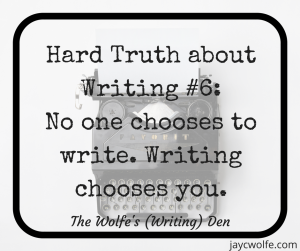 In Soviet Russia, book writes you! (You know I had to do it.)
In Soviet Russia, book writes you! (You know I had to do it.)
After learning all these hard truths about being a writer, you might be feeling a bit discouraged. Maybe you’ve changed your mind about writing and you’re already thinking about all the other skills you can put to good use instead. If that’s the case, then I’m sorry to say you were probably never meant to be a writer in the first place. But if you’ve made it to the end of this blog post and are more determined than ever to be a writer, then congratulations: writing has chosen you!
The funny thing about being a writer is that there isn’t always rhyme or reason to pursuing the craft. We write because we have to. I can’t tell you how many times I’ve looked back on old stories and blog posts I’ve written and thought, “Wow, this really sucks. Why did I write this?” And then I remember, “Oh right, because I couldn’t not write it.” This is our reality: when an idea calls, we must answer.
It’s easy enough to say you want to write your whole life, but talk is cheap. Only by doing it can you truly call yourself a writer. And if all the hard truths and fears and roadblocks of writing can’t deter you from actually sitting down and churning out those stories, then the writing life may be for you after all. So what are you waiting for? Stop reading this and get writing!
Have you learned any of these truths about writing the hard way? What other hard truths would you add to this list?
by Naomi L. | August 23, 2017 | Blog, Creative Writing |
There’s nothing quite like being in love, and for a writer who’s passionate about romance, it can be a gold mine of inspiration. I know that ever since I fell in love (most recently), I’ve found it much easier to write romantic stories and poetry, and even fiction in general. There’s plenty of creative inspiration to be found in love, so it’s only natural for artists to include so much of it in their art!
So for fun, today’s post is dedicated to a special someone who inspires much of my creative side. Here are three ways I’ve found that being in love can inspire your writing. Enjoy!
1) Being in love brings out the beauty in life.
As much as it sounds like a scene out of a cheesy romantic cartoon, being in love really does make the world around you more beautiful. And beauty is at the heart of so many of the most sincere and emotional works of art. Ever since falling in love, I’ve had a brighter outlook on life and a much deeper insight into the positive things in the world, and these have certainly manifested in my stories as romantic plots, satisfying conflict resolution, and happy endings.
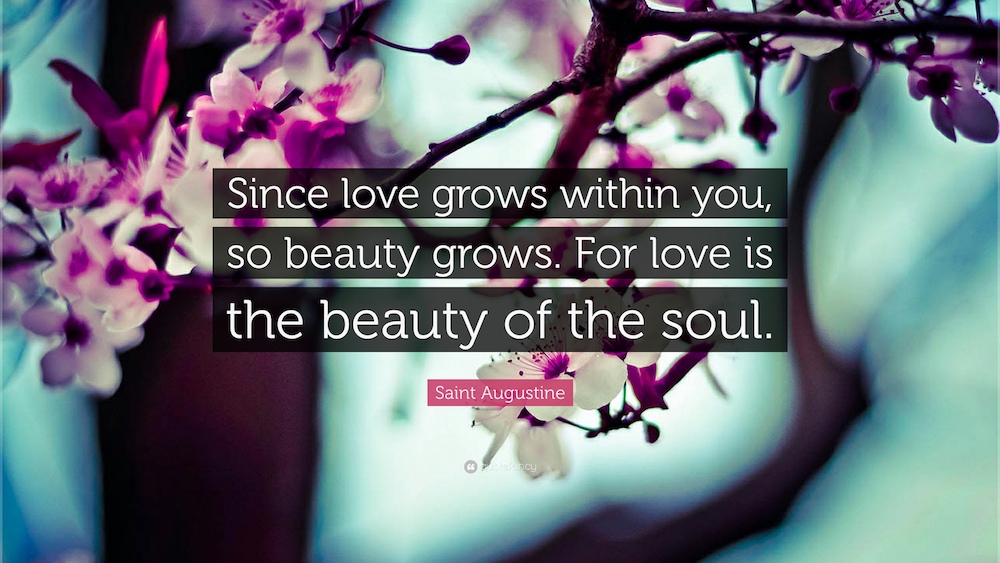
If you are or have ever been mutually in love, chances are you too have seen the world become a little brighter for it. You may know it poetically as “rose-colored glasses”, “butterflies in your stomach”, or “head over heels”, and maybe it’s even gone as far as to make you want to dance or shout with joy. Don’t limit that light to your real-world experiences; let it guide your imagination too! Write about the fluttering of the heart in a moment of passion or how much more vivid colors become through the eyes of a person in love. If writers should write what they know, then why not write about the magic in your life? It can often make for the most beautiful works of art!
2) Being in love helps relieve stress and anxiety.
 Sometimes I don’t even need to be writing romance to be inspired by love. As many writers well know, stress and anxiety can be real creativity killers depending on the kind of stories or poetry you’re trying to write. Unfortunately, the times we’re living in seem to be producing an overabundance of those bad feelings, which can translate into a severe lack of motivation for many of us. Maybe you can turn that anxiety into an aggressive streak of darker stories and poetry if that’s your style, but for writers like me, who favor romance and happy endings, it generally puts me out of the mood to create at all.
Sometimes I don’t even need to be writing romance to be inspired by love. As many writers well know, stress and anxiety can be real creativity killers depending on the kind of stories or poetry you’re trying to write. Unfortunately, the times we’re living in seem to be producing an overabundance of those bad feelings, which can translate into a severe lack of motivation for many of us. Maybe you can turn that anxiety into an aggressive streak of darker stories and poetry if that’s your style, but for writers like me, who favor romance and happy endings, it generally puts me out of the mood to create at all.
So whenever I’m feeling too stressed or anxious to write, I remind myself of how happy my significant other makes me and how good a place I’ve been in since we fell in love. Maybe it goes against the grain of the “tortured artist” stereotype, but I’m sure I do most of my best (or at least most productive) work when I feel emotionally fulfilled and free of tension. That’s not to say one should only ever use positive experiences in their fiction or poetry; after all, conflict is at the heart of every engaging story and many of the most interesting poems, and you absolutely should accept inspiration from your negative experiences too. But if you can, let real-life love motivate you to at least get those words out of your head. Not only is it one of the best treatments against stress and anxiety, it’s also a great cure for writer’s block!
3) Being in love can motivate you to be a better writer.
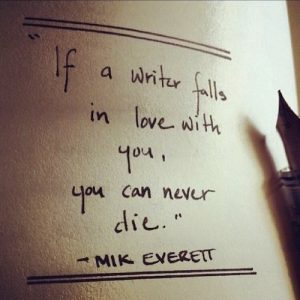 The great thing about love is that when you find it with the right person, you inspire each other to become better people. If nothing else, being in love gives me the motivation I need to be the best version of myself I can be. The amazing feeling of being loved by someone else pushes me to keep improving in the areas of my life that matter most, and few of those areas matter more to me than my passion for writing.
The great thing about love is that when you find it with the right person, you inspire each other to become better people. If nothing else, being in love gives me the motivation I need to be the best version of myself I can be. The amazing feeling of being loved by someone else pushes me to keep improving in the areas of my life that matter most, and few of those areas matter more to me than my passion for writing.
So I keep on giving it my all when I write, because if I deserve that special someone who works hard for both of us and does everything he can to support my passion, then he deserves someone who will work just as hard to help support him through her craft and keep coloring his life with all the art she creates. Relationships are all about teamwork, and if you’re really in love, you’ll want to put in the effort to make yours work. And if that includes being a better writer, then by all means let your love push you to keep reaching for those creative stars!
What about you? Have you ever been in love? How has that love inspired your writing?
by Naomi L. | August 16, 2017 | Blog, Creative Writing, Featured |
So you’ve just started writing fiction, but you’re not sure you’ve got what it takes. You’re afraid you’ll fail, that you’ll make a ton of writing mistakes and you’ll never be that amazing artist you hope to be someday. Or worse, maybe you think you’ll kill it as soon as you start, and your writing will be so awesome right out of the gate that you’ll never have to practice and improve (only to wonder years down the road why no one ever reads your incredible stories). Whether you suffer from imposter syndrome or unfounded arrogance, your expectations of writing are unreal.
Because guess what? Every writer makes mistakes! That’s how we learn and get better at our craft. But if you want to avoid learning some lessons the hard way (and I don’t blame you), it never hurts to turn to writing resources for help. So for all you blossoming writers out there, here are six common writing mistakes you’re bound to make at least once. Keep an eye out for these the next time you sit down to write!
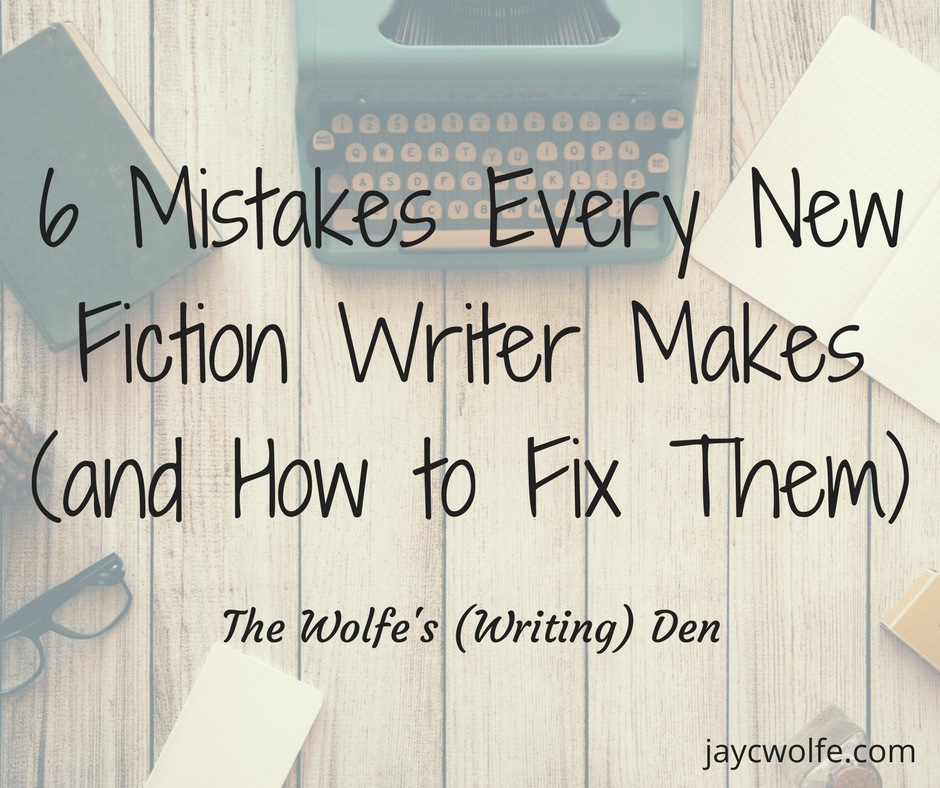
Writing Mistake #1: Stopping at the first draft (i.e. not editing)
The first draft of anything is sh*t. – Ernest Hemingway
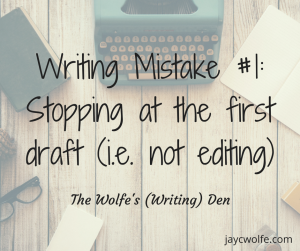 Let’s get this one out of the way first. A common mistake many new fiction writers make (including me when I started) is to write a full story, then set it aside and never touch it again. An important rule of fiction writing: Every piece must go through editing before it’s finished. To be fair, this isn’t as big a deal with private writing, but it’s still good practice for when you’re ready to start sharing your work.
Let’s get this one out of the way first. A common mistake many new fiction writers make (including me when I started) is to write a full story, then set it aside and never touch it again. An important rule of fiction writing: Every piece must go through editing before it’s finished. To be fair, this isn’t as big a deal with private writing, but it’s still good practice for when you’re ready to start sharing your work.
The truth is nothing you write is going to be perfect the first time around. Never assume you’ve created a masterpiece on your first try; even the greatest authors in the world need editors to help them shape their writing into publishable work. Heck, the blog post you’re reading now went through several rounds of revisions before I published it, and it still isn’t perfect!
So don’t stress about making something awesome right away. If anything, let this fact take away the pressure of having to write well all the time. Just write first, worry about making it publishable later. That’s what editing is for.
How to fix this writing mistake
Edit! Edit like your life depends on it, because your story’s life does. Readers don’t appreciate stories because they come out brilliant on the first try, but because the writer took the time to shape that first idea into a polished piece of art. Always make sure your work is worthy of publication before you share it. Need help? You don’t have to do it all alone; that’s what editors are paid for!
Writing Mistake #2: Using flowery language (i.e. purple prose)
Eschew surplusage. – Mark Twain, “Fenimore Cooper’s Literary Offenses” (1895)
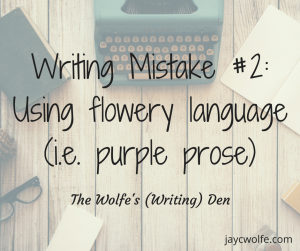 There’s this myth among beginning writers that the best way to be taken seriously is to sound as smart as possible. Maybe you’re insecure about your limited knowledge and vocabulary, so you stuff your stories with fancy words and fluffy sentences, then pat yourself on the back for creating distinguished and eloquent prose. Surely now you’ve proven yourself a great writer, right?
There’s this myth among beginning writers that the best way to be taken seriously is to sound as smart as possible. Maybe you’re insecure about your limited knowledge and vocabulary, so you stuff your stories with fancy words and fluffy sentences, then pat yourself on the back for creating distinguished and eloquent prose. Surely now you’ve proven yourself a great writer, right?
Wrong. While you may think all that fancy writing will give you credibility, you’ve actually just exposed yourself as an amateur. This common writing mistake is known as purple prose, and it can kill your story before it even starts. Counterintuitive as it sounds, using “smart” words and flowery language actually has the opposite effect of driving readers away, because the only people who waste their time reading stories they can’t understand are high school students trying to pass English. Everyone else wants a good story, not a vocabulary lesson.
Purple prose comes in a variety of flavors:
- big, difficult, pretentious words;
- flowery detail;
- too many adjectives and adverbs;
- said bookisms (only using words other than “said” as dialogue tags); and
- exaggerated sentiment (trying to “force” readers to feel certain emotions).
If you’re guilty of making any of these mistakes, stop and rewind. When you edit, make every effort to weed out the purple and strip your story down to the bare bones. You may have trouble getting used to this style, but in time you’ll find that concise and direct writing is the most effective form of storytelling.
How to fix this writing mistake
Replace big words and phrases with simpler ones, remove unnecessary adjectives, and cut out details that do nothing for your story. The idea is to sound as natural and direct as possible so you’ll connect with your readers. When in doubt, read your work out loud; if a word or phrase sounds strange, like something you’d never say in real life, delete it or replace it with a more common alternative.
Writing Mistake #3: Getting crazy with the punctuation!!!
Jake: Ok, I’m excited. I just don’t happen to like exclamation points.
Elaine: Well, you know, Jake, you should learn to use ’em! Like the way I’m talking right now, I would put exclamation points at the ends of all of these sentences! On this one! And on that one!
– Seinfeld (Season 5, Episode 4 – The Sniffing Accountant)
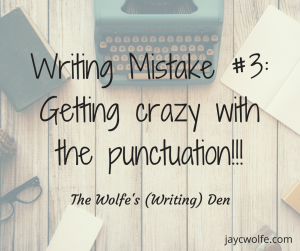 Of all the ridiculous situations in Seinfeld‘s nine-season run, few top the time Elaine screwed up her relationship over punctuation. The irony: her boyfriend was a writer whose book she was editing, and he was probably right not to use those exclamation points.
Of all the ridiculous situations in Seinfeld‘s nine-season run, few top the time Elaine screwed up her relationship over punctuation. The irony: her boyfriend was a writer whose book she was editing, and he was probably right not to use those exclamation points.
When writing fiction, punctuation is something you don’t want to mess up, because this mistake translates as lazy or incompetent writing. Trust me on this: As much as a scene calls for over-the-top excitement, you don’t need three exclamation points to get your point across. When you overuse punctuation, you’re conveying one of two messages to your reader:
- you don’t trust your writing enough to express emotion through words alone, or
- you don’t trust the reader to grasp the emotion in your words without help.
Either way, it doesn’t make you look good. Writers should always take care not to patronize their audience, and one of the easiest ways to do that is by using exclamation points and other punctuation marks where you don’t need them. That’s not to say you should avoid them altogether; you just shouldn’t use them as a crutch. Instead, trust your words to convey the right messages and emotion on their own. Remember that punctuation is simply an organizational tool; the focus should always be on your words.
How to fix this writing mistake
Stick to normal punctuation. Use exclamation points sparingly, avoid multiple punctuation, and know how to use commas, apostrophes, colons, semicolons, and hyphens correctly. When in doubt, turn your work over to a proofreader.
Writing Mistake #4: Writing dialogue that falls flat
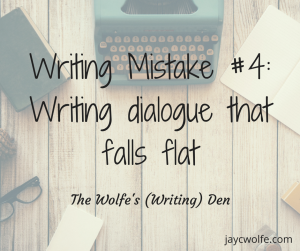 I confess: even after writing fiction for nearly my whole life, I still have trouble with dialogue. Maybe it’s because I’m shy and have little experience talking to people, but this seems to be my Achilles heel when it comes to writing stories. If you feel this is your weak point too, don’t worry, you’re not alone. In fact, dialogue is so hard to get right that this writing mistake could take up its own blog post, but for the sake of brevity, let’s focus on the main point.
I confess: even after writing fiction for nearly my whole life, I still have trouble with dialogue. Maybe it’s because I’m shy and have little experience talking to people, but this seems to be my Achilles heel when it comes to writing stories. If you feel this is your weak point too, don’t worry, you’re not alone. In fact, dialogue is so hard to get right that this writing mistake could take up its own blog post, but for the sake of brevity, let’s focus on the main point.
In a nutshell, dialogue is difficult to write well because it’s not quite speech and not quite narrative, but instead constitutes a class of its own. We think differently when we speak than when we write, so it takes a lot of practice to master the balance between both. Writing good dialogue involves removing the boring parts of everyday speech—pauses, ums, stutters, etc.—and refining it to a form that reads naturally while still conveying information relevant to the story. And while this may sound simple on the surface, it can take years of practice to learn how to:
- cut out the unnecessary parts of speech,
- make characters sound natural,
- give each character a distinct voice, and
- use a conversation to move the story forward.
So don’t feel bad if you’ve been writing for a long time and still struggle with this technique. Just keep practicing, and you’ll be writing good dialogue before you know it.
How to fix this writing mistake
Read your dialogue out loud and see how believable it sounds. If a phrase or sentence sounds odd, try to rephrase it in a way that a real person with your character’s background would say it. If you find this difficult, start paying attention to how people talk and incorporate more of their speaking styles into your writing (but not too much!). Condense dialogue as much as possible and make sure it always moves the story forward.
Writing Mistake #5: Telling more than showing
Don’t tell me the moon is shining; show me the glint of light on broken glass. – Anton Chekhov
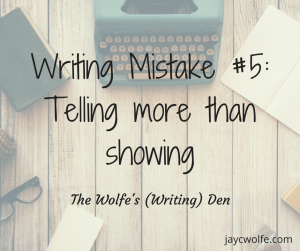 From creative writing courses to author blogs, we see this writing advice everywhere: show, don’t tell. This means that instead of outright stating a fact, you should give clues that help your readers figure the fact out for themselves. This technique is designed to create an immersive and engaging experience for your readers, and will often make the difference between a good narrative and a great story.
From creative writing courses to author blogs, we see this writing advice everywhere: show, don’t tell. This means that instead of outright stating a fact, you should give clues that help your readers figure the fact out for themselves. This technique is designed to create an immersive and engaging experience for your readers, and will often make the difference between a good narrative and a great story.
Granted, there will be times when telling is necessary because showing is impossible—such as telling exactly what a character is thinking or how an event has changed them internally—but conveying a simple idea or action in vivid imagery will add emotion and depth to your story. Instead of focusing on the idea itself, understand what makes that idea apparent and use those details to color the narrative. If a character is sad, describe the tears on her face or the way she hangs her head when someone talks to her. If it’s raining, describe your character hopping over puddles as he runs to the bus stop under a wet umbrella. Wherever possible, set the scene and let your audience fill in the blanks.
Good storytelling is not just telling people a story but bringing them on an emotional journey with you. So the next time you feel compelled to tell readers what’s going on, take a step back and assess how much you should tell and how much you can show instead. Master this balance and you’ll be one step closer to writing truly amazing stories!
How to fix this writing mistake
Read your story back and determine where the narrative falls flat. Highlight the passages that tell you something (e.g. “she was happy”, “it was a clear day”), then rewrite them in a way that will show you the same thing (e.g. “her laughter rose above the din”, “sunlight gleamed off the surface of the water”). Read through the story again and maintain the changes that make the narrative stronger.
Writing Mistake #6: Not writing!
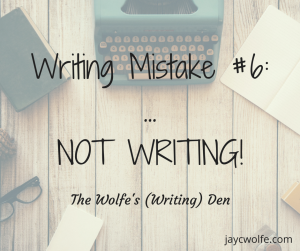 Yes, believe it or not, this is a common problem for beginning and advanced writers alike: not writing. Sounds counterintuitive, right? I mean, how can you be a writer if you don’t write?
Yes, believe it or not, this is a common problem for beginning and advanced writers alike: not writing. Sounds counterintuitive, right? I mean, how can you be a writer if you don’t write?
That’s just it: you can’t. But too many writers get so caught up in brainstorming, researching, self-editing, and worrying their work isn’t good enough that they don’t set aside enough time to actually write. It should go without saying that writing is the most important part of… well, writing, but most of the time, it’s just not that easy. When you sit for too long without doing any work, you succumb to deep-seated fears of failure and rejection, and before you know it, you stop writing before you even start.
So if you find yourself stuck in writing limbo, do yourself a favor and close your mind off to all your fears. Don’t stress about any of the other aspects of writing; just sit down and write. I know this is much easier said than done (speaking from experience), but once you get those words flowing, everything else will start to fall into place. Remember, unless you actually write, all those other steps are just a waste of time. Don’t be an “aspiring writer”; get out there and write!
How to fix this writing mistake
Write! Don’t worry about researching or editing or publishing or dealing with criticism yet. Just write. The rest will follow.
What about you? Are you guilty of making these writing mistakes? What other mistakes would you add to this list?
by Naomi L. | August 9, 2017 | Blog, Creative Writing |
Do you dream of writing a book but have no idea where to start? Have you already written your first draft but need help with editing? Is your manuscript finished but you can’t seem to find an agent or publisher who will help you get it to print? Have you published a book yourself but are struggling to make it a bestseller? Or are you just curious about how to navigate the world of self-publishing?
If you answered “yes” to any of these questions, then drop everything and tune in tonight at 9 pm EST / 6 pm PST to Chandler Bolt’s live Self-Publishing School webinar: How To Go From Blank Page to Published Author In 90 Days!

What is Self-Publishing School?
Who is this Chandler Bolt, you ask? He’s the creator of Self-Publishing School, an online course that guides you through the entire process of self-publishing a book, from coming up with an idea to achieving bestseller status on Amazon! The course is designed to streamline the self-publishing process into a 90-day program, but you can complete it as quickly or slowly as you want; an SPS membership is a one-time purchase that gives you lifetime access to the course!
In tonight’s workshop, Chandler will talk about:
- the 3-step system to write, publish, and launch a bestselling book in 90 days;
- the dream-killing myths about becoming an author that are holding you back from success;
- how to find a book idea in under an hour;
- how to leverage your book to grow your authority, income, and business;
- case studies of successful Self-Publishing School students; and
- how he made $4,000/month from his first book.
And don’t be alarmed, fiction writers: while much of it seems to be geared toward nonfiction, this course is for all types of authors. Self-Publishing School does have resources specific to fiction authors, so be sure to take advantage of them if you choose to enroll!
You’ll learn much more about Chandler and Self-Publishing School by watching the webinar tonight. I’m sure it will be worth your time; it was certainly worth mine!
My Experience with Self-Publishing School (So Far)
So it’s time I let you all in on a secret: I’m finally on my way to self-publishing my first novel! I’ve been longing to write my debut novel for ages, but being the worst procrastinator ever, I never really got past the planning stage. After signing up for Self-Publishing School a few months ago, I wrote a 100,000-word fantasy novel in less than two months! I’m now in the editing phase (which may take even longer, but I’m more excited than ever), and I have a myriad of resources at my disposal for the upcoming stages of publishing and launching the book.
Aside from a lifetime-access 90-day guide, the course offers one-on-one coaching, outsourcer listings for editors and book cover designers, weekly live Q&A hangouts, and a friendly community of fellow students who all support each other through the self-publishing journey. Honestly, the community is my favorite part; writing a book can be such a lonely and confusing process, so it’s good to connect with other authors who know the struggles of self-publishing and help each other launch their books successfully!
Based on my experience so far, I’d highly recommend Self-Publishing School to any writer who’s been dreaming of writing a book for years but hasn’t yet made the leap. Don’t worry, though, there’s no need to commit yet. Just check out the live webinar tonight and then see if SPS is a good fit for you. Only you can decide if you’re ready to invest in your book and your future!
The webinar starts tonight, August 9th, at 9 pm EST / 6 pm PST! Be sure to reserve your spot now! Don’t miss it!
Disclaimer: this post contains affiliate links for Self-Publishing School. All opinions expressed here are my own. The webinar is free, but I will get a commission if you choose to enroll in SPS. Thanks for supporting my blog!
by Naomi L. | August 2, 2017 | Blog, Creative Writing, What If? Writing Prompts |
Here’s a funny coincidence: I was recently looking through my archives of “What If?” Writing Prompts when I noticed that the last time I shared a set of mystery and suspense prompts was exactly a year ago tomorrow! So while I’m catching up on my blogging, I decided it would be fun to share a new batch of prompts in this genre, one year apart. See what mysterious stories you can create from these ideas, and feel free to add more of your own! Have fun!
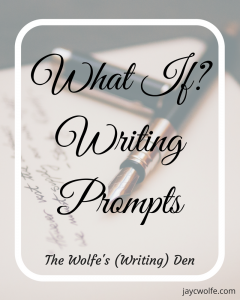 What if… you discovered that your best friend was actually a spy for a hostile foreign power?
What if… you discovered that your best friend was actually a spy for a hostile foreign power?
What if… you found strange messages in your private journals and notebooks that you don’t remember writing?
What if… you found alive and well a celebrity that the whole world thought was dead?
What if… an object in your house kept changing position even though you never touched it?
What if… a close friend or relative thought to have committed suicide left you a message in their will asking you to track down their killer?
Good luck writing some more mysterious and suspenseful stories!
If you have any “What If?” writing prompt suggestions (for any theme), please feel free to share them in the comments below. Ideas I like may be featured in future “What If?” posts, with full credit and a link to your blog (if you have one)! Also, if you’ve written a piece based on an idea you’ve found here, be sure to link back to the respective “What If?” post. I would love to see what you’ve done with the prompt! Thank you!

 In a way, fiction writers make up their own class of superheroes. Some people have super strength, others are incredibly smart, and still others excel at almost everything they try. But writers? We have the ultimate gift: the power of creation.
In a way, fiction writers make up their own class of superheroes. Some people have super strength, others are incredibly smart, and still others excel at almost everything they try. But writers? We have the ultimate gift: the power of creation. There’s nothing like writing a story to get those creative juices flowing. It’s no secret that writing has several psychological benefits such as catharsis and improved learning, and writing fiction has the added benefit of exercising the imagination. Creativity is always a useful skill, so you can never have too much of it!
There’s nothing like writing a story to get those creative juices flowing. It’s no secret that writing has several psychological benefits such as catharsis and improved learning, and writing fiction has the added benefit of exercising the imagination. Creativity is always a useful skill, so you can never have too much of it! There’s a saying that goes, “Never wrong a writer. They get their revenge in print.” There’s another saying that goes, “If a writer falls in love with you, you can never die.” What do these sayings have in common? They prove that writers have the most powerful emotions in the world.
There’s a saying that goes, “Never wrong a writer. They get their revenge in print.” There’s another saying that goes, “If a writer falls in love with you, you can never die.” What do these sayings have in common? They prove that writers have the most powerful emotions in the world. Think of the last time you wrote a story about something you’ve never done before. Chances are you had to do a fair amount of research to get it right, and you probably learned something unexpected while you did. This is one of the most enjoyable parts of writing fiction: you learn something new every day!
Think of the last time you wrote a story about something you’ve never done before. Chances are you had to do a fair amount of research to get it right, and you probably learned something unexpected while you did. This is one of the most enjoyable parts of writing fiction: you learn something new every day! Let’s be honest: the absolute best writing always comes from the heart, and the only way to write from the heart is to be yourself. Hiding behind a mask of civility may get you ahead in the corporate world, but when it comes to writing fiction, imperfection is your greatest asset. No matter what genre you write in, it’s your original voice that will make it unique. You don’t have to be completely crazy (though eccentricity is definitely a plus); you just have to be relatable. And if you’re flawed—or in other words, human—you’ve already got that covered.
Let’s be honest: the absolute best writing always comes from the heart, and the only way to write from the heart is to be yourself. Hiding behind a mask of civility may get you ahead in the corporate world, but when it comes to writing fiction, imperfection is your greatest asset. No matter what genre you write in, it’s your original voice that will make it unique. You don’t have to be completely crazy (though eccentricity is definitely a plus); you just have to be relatable. And if you’re flawed—or in other words, human—you’ve already got that covered. There are few forms of writing that make an impact quite the way storytelling does. While nonfiction generally focuses on logic and rational thought, stories have the power to mix truth with emotion in a unique style that appeals to a reader’s entire character, thus making for much more influential writing.
There are few forms of writing that make an impact quite the way storytelling does. While nonfiction generally focuses on logic and rational thought, stories have the power to mix truth with emotion in a unique style that appeals to a reader’s entire character, thus making for much more influential writing.

 If you’re thinking about pursuing writing because it’s an easy way to make a living right off the bat, then stop right there. Turn around and go back, because this is not the calling for you. Or if you insist, proceed and find out the hard way: writing is not as easy as you think. In fact, some would go as far as to say writing is one of the hardest things in the world to do. Tons of hard work for relatively little reward? Nothing easy about that.
If you’re thinking about pursuing writing because it’s an easy way to make a living right off the bat, then stop right there. Turn around and go back, because this is not the calling for you. Or if you insist, proceed and find out the hard way: writing is not as easy as you think. In fact, some would go as far as to say writing is one of the hardest things in the world to do. Tons of hard work for relatively little reward? Nothing easy about that. After dispelling the first myth about writing being easy, you may still want to pursue it for the sheer love of the craft. There’s nothing wrong with that; after all, a journey to becoming a writer should start with passion. But there’s more to being a writer than just writing.
After dispelling the first myth about writing being easy, you may still want to pursue it for the sheer love of the craft. There’s nothing wrong with that; after all, a journey to becoming a writer should start with passion. But there’s more to being a writer than just writing. We all like to imagine artists as eccentric people in constant connection with the muses. Beauty is in everything, and even the most mundane details can be turned into a work of art in the mind of a creative person. Inspiration is anywhere and everywhere; you just have to know where to find it.
We all like to imagine artists as eccentric people in constant connection with the muses. Beauty is in everything, and even the most mundane details can be turned into a work of art in the mind of a creative person. Inspiration is anywhere and everywhere; you just have to know where to find it. Picture this: You’ve finally published that novel you’ve been working on for years. You’ve done everything you could to make it perfect; now you sit back and wait for the praise to start rolling in. And for a while, it does: first from friends and family, then from total strangers! Everyone is liking your book! You’re a success! But just when you finally start to shed that crippling self-doubt…
Picture this: You’ve finally published that novel you’ve been working on for years. You’ve done everything you could to make it perfect; now you sit back and wait for the praise to start rolling in. And for a while, it does: first from friends and family, then from total strangers! Everyone is liking your book! You’re a success! But just when you finally start to shed that crippling self-doubt…
 Have you ever read a well-known piece of writing—a novel, a short story, a poem—that was truly awful? Chances are you thought you could do way better. Maybe you can. Maybe you do. And maybe someday you’ll wonder why your name doesn’t appear next to those authors on the bestseller lists. Why should you have to struggle to be noticed while these writers get to enjoy fame they don’t deserve?
Have you ever read a well-known piece of writing—a novel, a short story, a poem—that was truly awful? Chances are you thought you could do way better. Maybe you can. Maybe you do. And maybe someday you’ll wonder why your name doesn’t appear next to those authors on the bestseller lists. Why should you have to struggle to be noticed while these writers get to enjoy fame they don’t deserve? In Soviet Russia, book writes you! (You know I had to do it.)
In Soviet Russia, book writes you! (You know I had to do it.)
 Sometimes I don’t even need to be writing romance to be inspired by love. As many writers well know, stress and anxiety can be real creativity killers depending on the kind of stories or poetry you’re trying to write. Unfortunately, the times we’re living in seem to be producing an overabundance of those bad feelings, which can translate into a severe lack of motivation for many of us. Maybe you can turn that anxiety into an aggressive streak of darker stories and poetry if that’s your style, but for writers like me, who favor romance and happy endings, it generally puts me out of the mood to create at all.
Sometimes I don’t even need to be writing romance to be inspired by love. As many writers well know, stress and anxiety can be real creativity killers depending on the kind of stories or poetry you’re trying to write. Unfortunately, the times we’re living in seem to be producing an overabundance of those bad feelings, which can translate into a severe lack of motivation for many of us. Maybe you can turn that anxiety into an aggressive streak of darker stories and poetry if that’s your style, but for writers like me, who favor romance and happy endings, it generally puts me out of the mood to create at all. The great thing about love is that when you find it with the right person, you inspire each other to become better people. If nothing else, being in love gives me the motivation I need to be the best version of myself I can be. The amazing feeling of being loved by someone else pushes me to keep improving in the areas of my life that matter most, and few of those areas matter more to me than my passion for writing.
The great thing about love is that when you find it with the right person, you inspire each other to become better people. If nothing else, being in love gives me the motivation I need to be the best version of myself I can be. The amazing feeling of being loved by someone else pushes me to keep improving in the areas of my life that matter most, and few of those areas matter more to me than my passion for writing.
 Let’s get this one out of the way first. A common mistake many new fiction writers make (including me when I started) is to write a full story, then set it aside and never touch it again. An important rule of fiction writing: Every piece must go through editing before it’s finished. To be fair, this isn’t as big a deal with private writing, but it’s still good practice for when you’re ready to start sharing your work.
Let’s get this one out of the way first. A common mistake many new fiction writers make (including me when I started) is to write a full story, then set it aside and never touch it again. An important rule of fiction writing: Every piece must go through editing before it’s finished. To be fair, this isn’t as big a deal with private writing, but it’s still good practice for when you’re ready to start sharing your work. There’s this myth among beginning writers that the best way to be taken seriously is to sound as smart as possible. Maybe you’re insecure about your limited knowledge and vocabulary, so you stuff your stories with fancy words and fluffy sentences, then pat yourself on the back for creating distinguished and eloquent prose. Surely now you’ve proven yourself a great writer, right?
There’s this myth among beginning writers that the best way to be taken seriously is to sound as smart as possible. Maybe you’re insecure about your limited knowledge and vocabulary, so you stuff your stories with fancy words and fluffy sentences, then pat yourself on the back for creating distinguished and eloquent prose. Surely now you’ve proven yourself a great writer, right? Of all the ridiculous situations in Seinfeld‘s nine-season run, few top the time
Of all the ridiculous situations in Seinfeld‘s nine-season run, few top the time  I confess: even after writing fiction for nearly my whole life, I still have trouble with dialogue. Maybe it’s because I’m shy and have little experience talking to people, but this seems to be my Achilles heel when it comes to writing stories. If you feel this is your weak point too, don’t worry, you’re not alone. In fact, dialogue is so hard to get right that this writing mistake could take up its own blog post, but for the sake of brevity, let’s focus on the main point.
I confess: even after writing fiction for nearly my whole life, I still have trouble with dialogue. Maybe it’s because I’m shy and have little experience talking to people, but this seems to be my Achilles heel when it comes to writing stories. If you feel this is your weak point too, don’t worry, you’re not alone. In fact, dialogue is so hard to get right that this writing mistake could take up its own blog post, but for the sake of brevity, let’s focus on the main point. From creative writing courses to author blogs, we see this writing advice everywhere: show, don’t tell. This means that instead of outright stating a fact, you should give clues that help your readers figure the fact out for themselves. This technique is designed to create an immersive and engaging experience for your readers, and will often make the difference between a good narrative and a great story.
From creative writing courses to author blogs, we see this writing advice everywhere: show, don’t tell. This means that instead of outright stating a fact, you should give clues that help your readers figure the fact out for themselves. This technique is designed to create an immersive and engaging experience for your readers, and will often make the difference between a good narrative and a great story. Yes, believe it or not, this is a common problem for beginning and advanced writers alike: not writing. Sounds counterintuitive, right? I mean, how can you be a writer if you don’t write?
Yes, believe it or not, this is a common problem for beginning and advanced writers alike: not writing. Sounds counterintuitive, right? I mean, how can you be a writer if you don’t write?
 What if… you discovered that your best friend was actually a spy for a hostile foreign power?
What if… you discovered that your best friend was actually a spy for a hostile foreign power?
Recent Comments